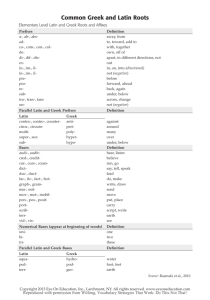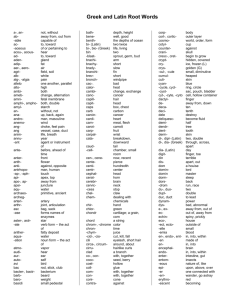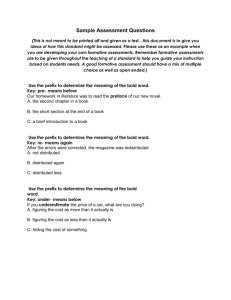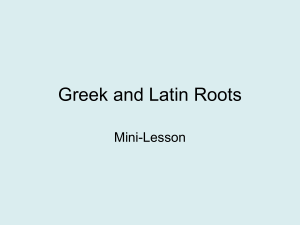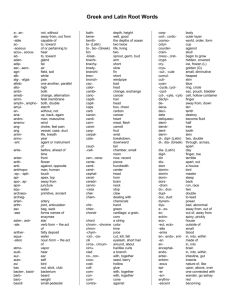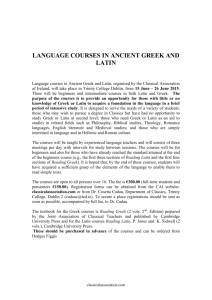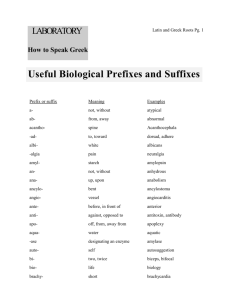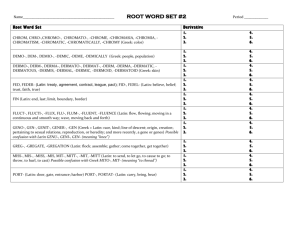An Introduction to Morphology and Etymology1
advertisement
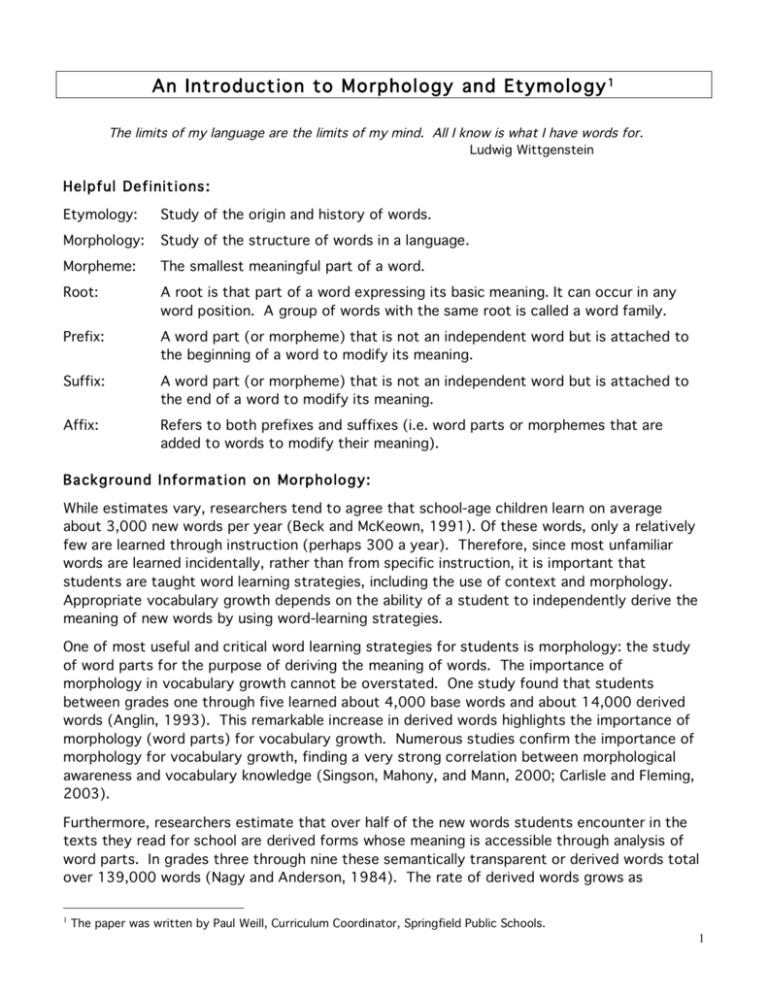
An Introduct ion to Mo rphology and Etymo lo gy 1 The limits of my language are the limits of my mind. All I know is what I have words for. Ludwig Wittgenstein Helpful Definit ions : Etymology: Study of the origin and history of words. Morphology: Study of the structure of words in a language. Morpheme: The smallest meaningful part of a word. Root: A root is that part of a word expressing its basic meaning. It can occur in any word position. A group of words with the same root is called a word family. Prefix: A word part (or morpheme) that is not an independent word but is attached to the beginning of a word to modify its meaning. Suffix: A word part (or morpheme) that is not an independent word but is attached to the end of a word to modify its meaning. Affix: Refers to both prefixes and suffixes (i.e. word parts or morphemes that are added to words to modify their meaning). Ba ck g ro un d I nfor mat ion on Mo rp ho lo g y: While estimates vary, researchers tend to agree that school-age children learn on average about 3,000 new words per year (Beck and McKeown, 1991). Of these words, only a relatively few are learned through instruction (perhaps 300 a year). Therefore, since most unfamiliar words are learned incidentally, rather than from specific instruction, it is important that students are taught word learning strategies, including the use of context and morphology. Appropriate vocabulary growth depends on the ability of a student to independently derive the meaning of new words by using word-learning strategies. One of most useful and critical word learning strategies for students is morphology: the study of word parts for the purpose of deriving the meaning of words. The importance of morphology in vocabulary growth cannot be overstated. One study found that students between grades one through five learned about 4,000 base words and about 14,000 derived words (Anglin, 1993). This remarkable increase in derived words highlights the importance of morphology (word parts) for vocabulary growth. Numerous studies confirm the importance of morphology for vocabulary growth, finding a very strong correlation between morphological awareness and vocabulary knowledge (Singson, Mahony, and Mann, 2000; Carlisle and Fleming, 2003). Furthermore, researchers estimate that over half of the new words students encounter in the texts they read for school are derived forms whose meaning is accessible through analysis of word parts. In grades three through nine these semantically transparent or derived words total over 139,000 words (Nagy and Anderson, 1984). The rate of derived words grows as 1 The paper was written by Paul Weill, Curriculum Coordinator, Springfield Public Schools. 1 students get older. This is because as students get older, and their reading takes them into increasingly lower ranges of word frequency, the proportion of derived words they encounter increases. Although there are an extensive number of word parts, it is estimated that about 80% of English words are derived from Greek and Latin root words, roots and affixes. Moreover, Greek and Latin words are found extensively in the content areas—especially math and science. Therefore, teaching Latin and Greek roots and affixes and morphological word learning strategies is an excellent way to increase vocabulary. Of course, there are many word parts to learn. Fortunately, there are some roots and affixes that are used more widely than others to form words. These common roots and affixes should be the focus of instruction. For example White, Sowell and Yanagihara, (1989) found the following: The three m ost frequent p refixe s account for over half of all prefixed words in English. un- (not) 26% re- (again, back) 14% in-, im-, ir-, il- (not) 11% Total: 51% The three m ost frequent English. -s, -es (more than one) -ed (past tense verbs) -ing (present participle) Total: su ffix es account for nearly two-thirds of all suffixed words in 31% 20% 14% 65% Ba ck g ro un d I nfor mat ion on Et ymo log y: Etymology is the study of the origin and history of words. It is not something that many K-12 students know about. If they know anything about etymology, they don’t know the word for what they are doing or they confuse it with entomology, the study of insects. Etymology is often seen as something only for the tweedy types at universities. This is unfortunate, because etymology can be very interesting, motivating and useful for elementary and secondary students. Knowing where words come from and how they have evolved is fascinating and is one way to motivate students to explore and play with words, which helps to increase vocabulary. The history or etymology of a word provides a cultural context that can help imprint new words in memory. Etymologies can serve as an excellent way to help deepen students’ understanding of words. Words are what we use to communicate. They are the essential building blocks of language. We can only think the thoughts that we have words for. All languages are made up of words, and the number of languages in the world is remarkable. Currently, there are more than five thousand different languages. However, about 90 percent of the world’s populations speak one of approximately 200 languages (Greenberg and Ruhlen, 1999). The list below shows the approximate number of people who call a language their native, or first, language. 2 Ord er Top T we lve L an gu ag es Lan g ua ge Nu mb er o f S pea kers 1 Mandarin 850 million 2 Hindi 350 million 3 Spanish 340 million 4 English 320 million 5 Arabic 200 million 6 Bengali 200 million 7 Portuguese 160 million 8 Russian 160 million 9 Japanese 110 million 10 German 100 million 11 French 85 million 12 Cantonese 85 million Note: If second-language speakers were considered, the numbers for some languages would be quite different. The number of English and French speakers, for example, would double. We typically don’t wonder where languages come from because they just seem to be there: French in France, English in England, Chinese in China, Japanese in Japan, and so forth. Yet only a few thousand years ago, none of these languages were spoken in their respective countries and indeed none of these languages existed anywhere in the world. Where did they all come from? In some cases, the answer is clear and well known. We know that Spanish is simply a later version of the Latin language that was spoken in Rome two thousand years ago. Latin spread with the Roman conquest of Europe and, following the breakup of the Roman Empire, the regional dialects of Latin gradually evolved into the modern Romance languages: Sardinian, Rumanian, Italian, French, Catalan, Spanish, and Portuguese. A language family, such as the Romance family, is a group of languages that have all evolved from a single earlier language, in this case Latin. Linguists, folks who study languages and words, classify languages into groups based on common origins. These groups, called language families, follow the model of a “family tree.” For example, English and German can be considered “sister” language because they are both descended from Germanic. English and French, on the other hand, are more distant relatives; they are not directly descended from the same language, but they share a common ancestor, Indo-European. See the language charts below for more details. An English judge stationed in India at the end of the eighteenth century, Sir William Jones had the revelation that Latin, Greek, and Sanskrit, the ancient language of India, had sprung from a common source. Jones also proposed that the Celtic and Germanic languages, along with Old Persian, probably belonged to the same language family. We now know that this family, called Indo-European, encompasses most of the languages of Europe and extends into the Middle East and southwestern Asia. While others had noticed similarities among Sanskrit and various European languages, it took Jones — who made systematic comparisons of vocabulary and grammar, and who understood 3 that languages evolve in an orderly fashion — to supply compelling evidence of the IndoEuropean language family and its extinct ancestor. His comparative approach became one of the key tools of linguistic analysis (See the language charts below for more details.). English was first spoken in Britain in the 5th Century. English is a Germanic Language of the Indo-European Family. English, however, is comprised of many languages. In fact, about 80% of English words have their origin in another language, especially Latin and Greek. English today is by far the most widespread of the world's languages. More people actually speak Mandarin Chinese, Hindi and Spanish but Mandarin is generally only spoken in one part of the world whereas English is spoken all over the world. English is the official language of over 45 countries, which is far more than countries where the official language is Hindi or Spanish. English is the language of science, aviation, computing, diplomacy and tourism. Half of all business deals are conducted in English. Two thirds of all scientific papers are written in English. Over 79% of all mail is written and addressed in English. Of all the world's languages, English has the largest vocabulary, the greatest number of words. The Oxford English Dictionary lists about 500,000 words; and there are about 500,000 more words that are technical and scientific terms that remain uncatalogued. Almost everyday more words are added. By comparison, German has a vocabulary of about 185,000 and French has fewer than 100,000 words. Since English has so many words, it is a great challenge for students to learn English vocabulary. Fortunately, the average English speaker knows only about 20,000 words and uses about 2,000 different words in a week. However, precision and nuance with the English language improves with increases in working vocabulary. English also doesn’t consistently follow spelling rules or pronunciation conventions so this makes it a challenge to spell correctly. For example, "ough" spells "tough", "trough", and "although", which are all pronounced differently. Another reason that it is very difficult to spell in English is that 70 percent of words in English require a visual memory to spell correctly. F. Scott Fitzgerald, a great American novelist in the early 1900’s, had over 700 misspelled words in his final draft of his novel, The Great Gatsby. He was a great writer but not a great speller because he had a poor visual memory of how words were spelled that did not follow basic spelling rules. 4 5 6 This world map shows the approximate distribution of Indo-European(IE) languages around the world. Within the red borders, the IE languages are the predominant or official languages. In addition to the nations within the red borders, most of the African nations have an Indo-European language (chiefly English or French) as a second official language. The map is only an approximation, but it gives you a good idea of where IE languages are spoken on the Earth. There are, of course other languages spoken within the IE area, such as American Indian languages, Basque, Hawaiian, the Australian aboriginal languages, and many others. Also note (hard to see on the map) that there is a red border around Hungary, which excludes that nation. Hungarian is not an IE language, although it is completely surrounded by IE-speaking nations. The same applies to Finland and Estonia 7 Hist or y o f t he E n glish La n gua ge The figure below shows the timeline of the history of the English language. The earliest known residents of the British Isles were the Celts, who spoke Celtic languages—a separate branch of the Indo-European language family tree. Over the centuries the British Isles were invaded and conquered by various peoples, who brought their languages and customs with them as they settled in their new lives. There is now very little Celtic influence left in English. The earliest time when we can say that English was spoken was in the 5th century CE (Common Era—a politically correct term used to replace AD). 8 HOW WORDS ARE CREATED 2 Words come into English language in a number of ways. They include: 1. By imitation of sounds (onomatopoeia) such as: • meow, • bang, • crackle, • zip, and • ring. 2. Through extended meanings where the verb fly becomes: • the name of an insect, • a baseball that is hit high, or • the space over a theater stage. 3. As derivations such as: • from study comes student, • from moon comes month 4. Through compound words such as: • notebook, bedroom and mailbox are some obvious examples • elbow (ell + bow) and • lackadaisical (from the expression 'lackaday' which itself derives from 'alack the day'). 5. From a root plus an affix such as: • prefix + root, i.e. pro- (forward or forth) + duce (lead) = produce ("bring forth") • Root + suffix, i.e. wonder + -full = wonderful 6. Through changing pronunciation such as: • breakfast, • cupboard, • extraordinary 7. Through changing spelling, for example: • Alone is from 'all one'. • Felt was once used to strain liquid, so the piece of felt used as the strainer became known as a felter, which later changed to filter. • "God be with you" was once a valediction that, over the centuries, came to be pronounced and spelled as good-bye. 8. From names (eponyms3) • People's names i.e. the Teddy Bear is named after Teddy Roosevelt and the electrical volt after Alessandro Volta. • Place names, i.e. frankfurters are named after Frankfurt, Germany, and jeans after Genoa, Italy. • Trade names: Kleenex, Band-aid, Jello, Xerox, Hoover 9. From the shortening or truncating of words • telephone becomes phone, • photograph becomes photo, • megabyte becomes meg 10.From acronyms 2 3 adapted from http://www.takeourword.com/theory.html#How Issue 208 of the bi-weekly Word-origin Webzine An eponym is a word for whom or which something is or is believed to be named 9 • sonar = S O und N Avigation Ranging, • laser = Light Amplification by Stimulated E mission of Radiation 11.From a blending of two or more distinct forms (portmanteau words) • motor + hotel = motel • smoke + fog = smog 12.From foreign words • influenza (Italian) • rendezvous (French) • chow (Chinese) • opal (Sanskrit) 13.Invented words • quiz The story goes that a Dublin theatre proprietor by the name of Richard Daly made a bet that he could, within forty-eight hours, make a nonsense word known throughout the city, and that the public would give a meaning to it. After the performance one evening, he gave his staff cards with the word 'quiz' written on them, and told them to write the word on walls around the city. The next day the strange word was the talk of the town, and within a short time it had become part of the language. This picturesque tale appeared as an anecdote in 1836, but the most detailed account (in F. T. Porter's Gleanings and Reminiscences, 1875) gives the date of the exploit as 1791. The word, however, was already in use by then, meaning 'an odd or eccentric person', and had been used in this sense by Fanny Burney in her diary on 24 June 1782. 'Quiz' was also used as a name for a curious toy, something like a yo-yo and also called a bandalore, which was popular around 1790. The word is nevertheless hard to account for, and so is its later meaning of 'to question, to interrogate', which emerged in the mid-19th century and gave rise to the most common use of the term today, for an entertainment based on questions and answers (1782, source of quizzical). • quark coined in 1963 by U.S. physicist Murray Gell-Mann (b. 1929), who associated it with a word in Joyce's Finnegans Wake, read variously as E quark croak and G Quark curd, (slang) rubbish, tripe. Further details are found in his book T he Q ua r k a nd the J a gua r published in paperback in 1995. From Page 180: “In 1963, when I assigned the name "quark" to the fundamental constituents of the nucleon, I had the sound first, without the spelling, which could have been "kwork". Then, in one of my occasional perusals of Finne ga ns Wa ke, by James Joyce, I came across the word "quark" in the phrase "Three quarks for Muster Mark". Since "quark" (meaning, for one thing, the cry of the gull) was clearly intended to rhyme with "Mark," as well as "bark" and other such words, I had to find an excuse to pronounce it as "kwork".” 10 ROOTS AND AFFIXES SCOPE AND SEQUENCE It is estimated that 75 to 80 percent of the English language is made up of words and word parts that are found originally in Anglo-Saxon (Old English), Greek and Latin. Because most modern English words originated in other languages, it is very important that students be taught frequently occurring affixes and roots. The Lubbock, Texas Independent School District, developed the following lists. 4 The district was motivated to ensure that students were taught all of the prefixes, suffixes, and roots over the course of his/her academic career. The district also wanted to focus on what would be developmentally appropriate. Therefore, the reader will notice that the list is very heavy in 4th and 5th grade where it is most appropriate for the majority of these to be taught. As for 3rd grade, only one affix is listed with the intent that 3rd grade teachers will systematically review to assure mastery of the 1st and 2nd grade lists. It is the intent that the following affixes and roots should be taught at the following grade levels. It should be noted that generally, prefixes and suffixes change the meanings of roots, but it is usually the suffix that denotes the part of speech. Grade One Prefix Suffix -s,-es -ing -ed Origin AS AS AS Additional Information Grade Two (Please review affixes from prior grade.) Prefix Suffix Definition Examples unnot/opposite unlock, unsafe reagain/back reread, rewrite, return -er person connected with teacher, writer, baker -er a comparative degree bigger, colder, taller -est superlative degree biggest, coldest, tallest -ly characteristic of badly, friendly, quickly Origin AS L AS AS AS AS Additional Information Grade Three (Please review affixes from prior grade.) Prefix Suffix Definition Examples -y characterized by , like cloudy, fishy Origin AS Additional Information 4 Definition plural, more than one action/process past action/ process Examples hats, pigs, boxes, wishes helping, skipping, running, seeing, thinking jumped, helped Present participle of verb Past tense verb Usually an adjective Usually an adverb The Lubbock, Texas Independent School District has granted Springfield School District to use these materials. For more information on their work, contact the district at 1628 19th Street, Lubbock, TX 79401. Grade Four (Please review affixes from prior grade.) Prefix Suffix Definition Examples undertoo little, below underfed, underground overtoo much, above overdone, overhead disnot, opposite of dislike, distrust nonnot nonfat, nonsense prebefore preplan, pretest innot inactive, insane, inexpensive bitwo bicycle, binocular trithree tricycle, triangle quadfour quadrilateral, quadrant octeight octagon, octopus -ion -ation act of/state of/ attention, vision, invitation -sion -tion result of -able -ible can be done enjoyable, sensible, likable -ness -less -er -or -ful condition/state of without one who/ that which full of darkness, fairness careless, helpless baker, boxer, conductor, survivor beautiful, painful Origin AS AS L L L L L L/GR L L/GR AS L AS AS L AS Additional Information Noun (See 6th grade for explanation) -able ending words have roots that can stand alone; i.e. enjoy/able -ible ending words have roots that can not stand alone; i.e. sensib/ile Usually a noun Usually a noun Use –or with Latin roots for nouns (inventor, elevator) Usually an adjective Grade Five (Please review affixes from prior grade.) Prefix Suffix Root Definition Examples semihalf semicircle, semicolon superabove, on top, superfine, superhuman, beyond supersonic multimany, much multicolor, multifamily polymany, much polygon, polysyllable teledistant/far television, telephone, telescope in- (ilnot inability, impatient, irregular, im- ir-) illegal in- (ilim- ir-) in/ on/ toward, infer, illustrate, improve, irrigate Origin L L L GR GR L Additional Information il- used before roots beginning with l (illegible) im- used before roots beginning with b, m, p (immature, imbalance, impatient); ir- used before roots beginning with r (irregular) Same prefix usage is applied as above Prefix mis- Suffix Root intermidsubdecadecidi- diakilomillimillecenti- Definition bad or badly, wrong or wrongly between middle under, beneath, below, secondary ten two, through, across 1,000 1,000 100 one having a certain skill, relating to, belonging to act, process made of, to make condition of condition of, skill -ian, -an -ment -en -dom -ship -ness -ist -ess max(i) meter/ metr photo state of one who does a specific action feminine great measure light port scope to carry to watch, see tract form to draw, pull to shape Examples misbehave, misread, misspell Origin L Additional Information intercept, interview, interstate midnight, midweek subway, subsoil, substitute L AS L decathlon, decade, decimal, decimeter digraph, dialogue, diagonal kilogram, kilowatt, kilometer millennium, millimeter L/GR centimeter, centipede electrician, magician, American, suburban L L enjoyment, replacement wooden, dampen, tighten boredom, freedom, kingdom championship, friendship, hardship, leadership fitness, happiness artist, tourist L AS AS AS Usually a noun AS L/GR Usually a noun actress, lioness maximum, maximize diameter, odometer, metric, perimeter photograph, telephoto, photocopy portable, transport horoscope, microscope, telescope attract, distract, retract conform, reform, transform L/GR L GR Usually a noun GR GR L GR L GR L L Usually a noun Usually a noun Usually a noun Usually a noun Grade Six (Please review affixes from prior grade.) Prefix Suffix Root Definition ento cause to be, to emput into or onto, to go into or onto forebefore, earlier dereduce down, away from transacross, change, through antiopposite, against exout of, away, from autoself biolife minismall Examples encounter, enable, employ, embark, encircle Origin L forearm, foreword defeat, deform, decrease AS L transformation, transportation, transfer antibiotic, antifreeze extract, exhale, extend autograph, automatic biography, biological miniature, minimum L small, minute one, single state of, quality of related to, characterized by act of, state of, result of microbiology, microscope unicorn, unicycle, uniform prosperity, equality colonial, biennial, dental, betrayal tension, attention, elevation, union GR L L L AS The real suffix is–ion. Putting s or t in front of –ion is simply determined by the spelling of the root. Usually a noun relating to, characteristic of an action, condition childish, foolish AS Usually an adjective student, contestant, immigrant L Often a noun. The suffix –ant often indicates a person noun. causing a specific action obedient, absorbent, abundant, elegant L Often an adjective. -ent and –ant sound alike because of the schwa. –ent is used somewhat more often than –ant. -hood the state, the condition, the quality boyhood, likelihood AS Usually a noun History of the suffix: –hood • Old English: -had • Middle English: -hod • Modern English: -hood logy/ ology - science of, study of biology, chronology, theology, geology GR microuni-ity -al -ial -ion ation, sion tion -ish -ent, ant -ent -ant GR L/GR GR GR L Additional Information From the Latin word miniature… Modern generations shortened miniature to mini-. Usually a noun Usually an adjective Grade Six continued Prefix Suffix Root aqua Examples aquarium, aquamarine, aqualung action, react, transact Origin L emit, transmit anniversary, semiannual, millennium L L chief, ruler lead archenemy, matriarch induce, conduct GR L written, drawn autograph, paragraph, telegram GR earth, ground, soil hand name, word geography, geology manicure, manually antonym, synonym, homonym GR L GR voice, sound telephone, symphony GR rupt break, burst bankrupt, rupture, disruptive L scrib, script therm to write describe, manuscript, transcript L heat GR tox poison thermometer, thermostat, thermal toxic, toxicology act mit anni, annu, enni arch duct, duc gram, graph geo man nym. onym phon Definition water put in motion, process of doing to send year Additional Information L L Usually a noun Erupt means to explode. (The volcano erupted.) Irrupt means to rush or burst in. (The police irrupted into the hideout.) Verbs usually use scribe, as in prescribe; nouns usually use script, as in prescription. Grade Seven (Please review affixes from prior grade.) Prefix Suffix Root Definition Examples antein front of, before antecedent, antebellum abaacoconcom pro- Origin L Additional Information Fun information – antepenultimate means next to the next to the last…this word can usually be found on the SAT. from, away on, in, to without, not together, with absent, absorb, abnormal across, aboard, aside atypical, amoral, asocial cooperate, concede, combine L AS/L AS/L L forward, before, in support of within great, huge after, following full of, characterized by inclined, tending toward an action proceed, pronoun, prohibit L/GR intranet, intramural megabyte, megaphone postpone, postwar adventurous, nervous, mysterious, courteous festive, talkative, active, sensitive L GR L L -ence ance act, condition of persistence, excellence, assistance, importance L -ic relating to, characterized by to make, to cause to become to make result of an action, collection characterized by a specified quality, condition, or action time time air energetic, historic L/GR Words that end with –de (intrude) change the –de to s then add –ive (intrusive). Words that end with silent e (create) drop the e then add –ive (creative). Usually a noun -ence and –ance sound alike because of the schwa. –ence is used somewhat more often than –ance. Usually an adjective fertilize, criticize, apologize L/GR Usually a verb satisfy, magnify manage, drainage, acreage L L Usually a verb awesome, lonesome AS Primarily used with Anglo-Saxon base words. chronology, synchronize temporary, temperature aerial, aerospace GR L GR intramegapost-ous –ious -eous -ive –itive -ative -ize -fy -ify -age -some chron temp aer, aero L Concrete – meaning to harden or to grow together. Some words with pro- as a prefix are often hyphenated, so be sure to check the dictionary. Usually an adjective Grade Seven continued Prefix Suffix Root cede, ceed cept, ceive dict fract, frag gen grat ject liber leg, lect, lig mater, matr, matri pater, patr mot, mob opt ped, pod ped spect/ spec pop pend Definition to go, yield, surrender to take, catch, seize, hold to say, tell to break race, kind, or species, birth thanks, pleasing to throw free law, to choose, to pick, to read, to speak mother Examples proceed, secede, precede, concede receive accept, deceive Origin L Additional Information L Additional roots with same definition: cap (captive), ceit (conceit), cep (concept), cip (municipal) diction, dictator fracture, fraction, fragment gender, genetics, genesis L L L congratulations, gratify inject, objection liberty, liberate legend, legal, intelligent, elect, lecture L L L L maternal, matrimony, matriarch L father paternal, patriot, patriarch L to move eye, to make a choice foot child to see, watch, observe people to hang, weigh motivate, mobilize optometry, optic, optional L L pedal, pedestrian, tripod pediatrician prospect, respect, specimen L GR L population, popular suspend, pendulum L L The roots lect, lect, and lig are related to the Greek combining form logos, meaning speech or word. Grade Eight (Please review affixes from prior grade.) Prefix Suffix Root Definition hyperover, above, excessive hypobelow, less than normal hypomniall homosame heterodifferent, other ultra-cide -ery -ary -ism -ium -tude aud cred archae, arche, archi belli claim,/ clam hemo, hema luna mar mort path pel struc, struct vis, vid voc, voke cogn loc, loqu Examples hyperactive, hypercritical hypothermia, hypnosis Origin GR GR Additional Information omnipresent, omniscient homogeneous, homonym heterochromatic, heterogeneous L L GR beyond in degree, extreme kill relating to, quality, place where relating to, place where, one who act/ belief, practice of chemical element, group condition, state, quality of to hear, listen to believe primitive, ancient ultramarine, ultraviolet germicide, pesticide imagery, pottery, bakery L L AS Usually a noun dictionary, infirmary, cautionary, dietary, missionary patriotism, idealism, absenteeism helium, aquarium altitude, gratitude audible, audition credit, incredible archaeologist, archives, archetype L Noun or adjective L/GR GR L L L GR Usually a noun war to declare, call out, cry out blood moon sea death feeling, suffering, disease to drive, push to build belligerent, bellicose exclaim, clamor, clamorous hematology, hemophilia lunar, lunatic maritime, submarine mortuary, mortality apathetic, pathology expel, propeller construct, destruction, instructor L L GR L L L GR L L to see to call to know to speak, talk, say vision, evidence advocate, revoke cognition, recognize colloquial, ventriloquist, loquacious L L L L Heteronyms: words with the same spelling, but different meanings (dove – the bird; dove – did dive) Usually a noun Usually a noun Usually a noun See Affix Matrix for the root struct on final page of this document. Grade Nine (Please review affixes from prior grade.) Prefix Suffix Root Definition bene well, good cardi heart ego self don, donat give, gift luc, lum light mania madness, frenzy, abnormal desire, obsession nate, nat born neg no, deny neo new nov new phys nature phobia, irrational fear or hatred, one phobic, who fears, hates phobe psych mind, soul reg guide, rule sci to know, learn sol tact, tang terr vac ver/ veri alone to touch land empty true, genuine Examples benediction, beneficial cardiac, cardiology egocentric, egotistical, egoism donate, donation translucent, illuminate maniac, kleptomania Origin L L L L L GR native, innate negative, negate neonatal, neocortex novice, novitiate physics, physical aquaphobia, claustrophobic, technophobe L L GR L GR GR psychic, psychopath regime, regent science, conscience neuroscience solitary, soliloquy contact, tangible terrain, territory vacate, evacuate verdict, veritable GR L L L L L L L Additional Information There are names for more than 500 phobias, most of which come from the field of medicine. Affix Matrix re de s ed ing con de in ob sub super infra struct ive or ion ure ly s s ed ing al ly The A rts G reek and Latin R oots and Affix es Name Prefix Name Suffix Name Root Origin Definition Meaning Example Greek feeling, sensation aesthetics, esthetical calli- Greek beautiful calligraphy can-, cant- Latin sing canto, cantata, cantor cand- Latin glowing, iridescent candid, incandescent, candle, candela ceram- Greek clay ceramics choreo- Greek related to dance choreography, choreograph, choreographer cine- Greek motion cinema color- Latin color coloration cub- Greek cube cubic, cube, cuboid fant- Greek to show fantastic, fantasy flor- Latin flower floral, florid graph- Greek draw, write graphic, graphology laud-, laus-, plaus- Greek Greek Latin half movement, motion praise hemisphere elekinesis, kinetic energy, kinesthetic aplaud, laud lev- Latin light, lift elevator, levitation log- Greek thought, word monologue, logic, morphological loqu-, locut- Latin speak allocution, eloquent, loquacious lud-, lus- Latin play allude, illusion lumin- Latin light illumination, luminous manu- Latin hand manual, manuscript mimmulg-, muls- Greek Latin mimic milk mime, mimic emulsion mur- Latin wall immured, mural myth- Greek story mythic, mythology oct- Greek eight octagon, octahedron aesth-, esth- hemikine- 21 The Art s Gr ee k a nd Lati n R o ots a nd Affi xe s co nti nue d Name Prefix Name Suffix Name Root Origin Definition Meaning Example onym onom Greek name onomatopoeia, pseudonym phon- Greek sound microphone, phonograph phos-, phot- Greek light photograph prim- Latin first primary, primeval, primitive pup- Latin doll pupa, puppet quadrscrib-, script- Latin Latin four write quadrangle, quadrillion inscribe, scripture sculp- Latin carve sculpture, sculptor sign- Latin sign design, designate, signal spati- Latin space spatial spec-, spic-, spectsyn-, sy-, syl-, sym- Latin Greek look with conspicuous, inspection, specimen symbol, system terrtrans-, tra-, tran- Latin Latin dry land across terrace, terrain, terracotta tradition, transcend, transportation verb- Latin word verbal, verbatim, verbosity vid-, vis- Latin see video, vision voc- Latin voice vocal, vocation, provocative 22 Health G reek and Latin R oots a nd Affix es Nam e Pr e fix Nam e S uffi x Nam e Ro ot endoanti Ori gi n De fi niti o n Me aning Ex am pl e Greek within endogamy, endocardium, endocrine, endocarp, endoderm Greek against opposite antibiotic, antibody, antiseptic cardi/o Greek heart cardiac, cardiogenic, cardiologist cerebr/o Latin brain cerebral, cerebrate, cerebrospinal cranio Greek skull craniology, cranium, cranial dent, dont Latin tooth dental, dentist, dentures derm/a Greek skin dermatologist, pachyderm (elephant, rhinoceros) dermatitis gastr/o Greek stomach gastric, gastronomy, gastritis gyn/o/e Greek woman, female gynecology, gynephobia, gynecoid hem/o/a Greek hemorrhage, hemorrhoids, hemoglobin hyper Greek hyp/o Greek blood too much, over, excessive, beyond under Greek white, colorless leukemia, leukocyte, leucine Greek muscle myocardium, myasthenia, myosin Latin born innate, natal, natural necr/o Greek dead, death necrophil, necrosis, necrology nephr/o Greek kidney nephritis, nephrotomy, nephron neur/o Greek nerve neuralgia, neurologist, neurotic ocu Latin eye binoculars, monocula ortho Greek straight orthodontist, orthopedic, orthography osteo Greek osteoarthritis, osteopathy, osteology pneum/o Greek tox Greek bone breathing, lung, air, spirit poison zyg/o Greek pair zygote, zygomorphic leuk/o, leuc/o my/o nat hyperactive, hypercritical, hypertension hypoglycemia, hypothermia, hypothesis pneumonia, pneumatic, dyspnea detoxification, toxic, toxicology, intoxicated 23 Language Art s G reek and Lat in Roots and A ffixes Nam e Pr e fix Nam e S uffi x Nam e Ro ot Ori gi n De fi niti o n Mea ni ng Ex am pl e ante- Latin before, in front antebellum, anticedent, antechamber, auto- Greek, R of or by oneself autocrat, automatic, autobiography, autodial, auto-focus, autograph bene- Latin, Old English Latin good, well benefit, benediction, benefactor, benevolent, out of, excavate, ex libris, ex-wife, ex-husband, Latin to make or do factory, affect, benefactor, deface, defect. effect. affect, facilitate, factor, infect, manufacture Latin by hand manual, manuscript, manufacture, manus, manumission Latin to send admit, dismiss, emit, intermission, missile, mission, omit, remit, submit, transmit neo- Greek new neophyte, neo-classical, neo-conservative, Neolithic, neoliberalism, neologize, neoimpressionalism, neofascism, neocortex pan- Greek all of pantheon, pandemic, panacea, pandemonium, pan-American, panAfrican, pan-European pre- Latin before precede, preadolescent, preamble, prearrange, pre-atomic, prebuilt, Precambrian, precancerous, Lation, Old English Latin to carry export, porter, portage, deport, import, portable, portfolio, report, support, transport before, forward, in favor of, in place of proponent, pro and con, proactive, pro bono, pro forma, pro tem, proceed, exfac, fact, fic, fect man(u)mis, mit port pro- 24 Lan g ua ge Arts Gre ek a nd Lat in R oo ts a nd Affix es co nt in ued Nam e Pr e fix Nam e S uffi x Nam e Ro ot Ori gi n De fi niti o n Mea ni ng Ex am pl e proto- Greek first prototype, protocol, protozoa, protagonist, protoplasm, retro- Latin back, backward, behind retrospect, retrograde, retroactive, retrograde, retrospect, retrofit, retrovirus Latin to look inspect, spectacle, circumspect, introspection, perspective, respect, retrospective, spectator, speculate across, over, beyond transatlantic, transact, transfer, transient, translate, transmit, transport, transplant spec trans graph Greek write monograph, demographics, graphic, calligraphy, photograph, lithograph logia Latin, Greek the study of theology, biology, geology, anthropology, toxicology, meteorology, Greek straight, correct orthodox, orthodontia, orthography, orthopedics, orthoscopic, Latin agitate, confuse disturb, disturbed, disturbance, turbulent, turbulence Latin separate divide, divercate, diverge, divergent, diversity, diversify, diversion ques, quæstio Latin ask, seek question, questionnaire, questionable, unquestionable, query, mort, mors Latin death mortal, immortal, mortician, mortify, mortuary, mortality, mortal sin, break disrupt, abrupt, bankrupt, corrupt, corruptible, disruption, interrupt, interruption, rupture, lead, take, or bring together conduct, abduct, aqueduct, conducive, deduce, deductible, deduction, introduce, introduction, produce, reduce orthoturb div- rupt duc, duct Latin 25 Math Greek and Lat in Ro ots an d Affix es Nam e Pr e fix Nam e S uffi x Nam e Ro ot Ori gi n De fi niti o n Mea ni ng Ex am pl e mono, uni Latin< Greek one monopoly, monotype, monologue, mononucleosis, monorail, monotheist bi, di Latin two, twice, double divide, diverge, diglycerides, bifurcate, biweekly, bivalve, biannual three triangle, trinity, trilateral, tribune, trilogy, tricycle tri Greek quat, quad Latin four quadrangle, quadruplets, quaternary, quarter, quadrillion quint, penta Latin< Greek five quintet, quintuplets, pentagon, pentane, pentameter, quintillion hex, ses, sex Greek & Latin six hexagon, hexameter, sestet, sextuplets, sextillion sept Latin seven septet, septennial, septillion oct Latin Greek eight octopus, octagon, octogenarian, octave, octillion non Latin nine nonagon, nonagenarian, nonillion dec Greek ten decimal, decade, decalogue, decimate, decillion cent Latin hundred centennial, century, centipede, centillion mill, kilo Greek thousand millennium, kilobyte, kiloton mega Greek million megabyte, megaton, megaflop giga Greek billion gigabyte, gigaflop milli Latin thousandth millisecond, milligram, millivolt micro Greek millionth microgram, microvolt nano Greek billionth nanosecond, nanobucks hemi-, semi- Greek, Latin half, partial hemisphere, hemistich, hemiplegia, hemicycle, semiannual, semiarid, semiautomatic, semicircle Latin form or shape uniform, transform, conform, formulate, formula, formless, formidable, form 26 Science Lat in and G reek R oots and Affix es Nam e Pr e fix Nam e S uffi x Nam e Ro ot Ori gi n De fi niti o n Me aning Ex am pl e form Latin form or shape uniform, transform, conform, formulate, formula, formless, formidable, a or an Greek not, non or without amoral, anesthetic, apolitical, asocial, anabolic, ablate meso Greek middle, intermediate mesomorphic, mesolithic, mesozoic, mesophyll endo Greek inner, inside endoplasm, endomorph, endobiotic, endometria aero Greek aerobic, aerodrome, aerodynamic, aerofoil, aeroplane anti Greek air, oxygen, needing air or oxygen. against antibacterial, antiabortion, antimatter, anticlockwise amphi Greek on both sides, double, around amphibian. Amphibiotic, amphitheater, amphipod aqua Latin water aquatic, aquarium, aqueduct, aquaculture auto Greek self autobiography, automobile, autocracy, automaton bi Latin two, twice, double bicolored, bilateral, bimodal. Bilingual Latin life biography, bioactive, biology, antibiotic Greek green chlorophyll, chlorobenzene, chloroform Greek color chromatic, monochrome, polychrome Latin kill patricide, infanticide, herbicide. Suicide, homicide Greek cell cytoplasm, cytosol, cytogenetics, cytotoxic Greek skin dermatology, epidermis, hypodermic, dermatitis dia Greek across, separate, apart diameter, diameter, diagonal, dialogue, dialect, diagnosis, diagram di Greek two, double divide, diverge, diglycerides, ecto Greek on the outside, outer, external ectoder, ectoderm, ectoplasm, ectopic, ectothermal endo Greek within, inside, internal endoscope, endoblast, endocranium, endoplasm bio chlora chrom cide cyto derm Scie n ce L atin a nd G reek R oo ts a nd Affixes co ntinu ed Nam e Pr e fix Nam e S uffi x Nam e Ro ot Ori gi n De fi niti o n Me aning Ex am pl e Greek blood hemoglobin, hemophilia, hemorrhage Greek over, above, excessive hyperactive, hyperbole, hyperostosis, hypermorphosis hypo Greek under, below hypoallergenic, hypodermic, hypodermis, hypoglycemia intra Latin within, inside intracellular, intracranial, intramural, intranet Greek inflammation disease bronchitis, bursitis, cellulitis, tonsillitis, Latin side, a part or object at the side of something bilateral, equilateral, multilateral, unilateral Greek study of biology, geology, etymology, cardiology Greek measure geometric, thermometer, odometer, accelerometer one, single monologue, monotheism, monarchy, monogamy form, structure metamorphosis, amorphous, morphology, morphine micro small microburst, microchips, microorganism, microparticle, microscope, microeconomics macro large macrocosm, macroeconomics, macrobiotic, macrocytes multi many, multiple, more than one or two multicultural, multicolored, multilateral, multilocular Greek exaggerated fear or dislike photophobia, claustrophobia, agoraphobia, hydrophobia photo Greek light, radiant energy photochemical, photochromic, photobiotic syn Greek together synthesis, synchronous, synergy, snyopsis, photosynthesis tele Greek distance, from afar television, telephone, telegraph, telemetry, telepathy therm, thermo Greek heat thermal, thermometer, thermocouple, thermodynamic, thermoelectric vita Latin life vital, vitality, vitamins, revitalize hemo hyper itis lateral logy meter mono morph phobia Social Studies Greek and Latin Roots and Affixes Nam e Pr e fix Nam e S uffi x Nam e Ro ot Ori gi n De fi niti o n Mea ni ng Ex am pl e anthropo- Greek human being anthropology, anthropoid, anthropogenesis, anthropomorphic, contra- Latin against, opposite, contrasting people contradict, contraband, contraception, controversy, contrary democracy, plutocracy, aristocracy, timocracy, theocracy, democrat, autocrat, technocrat monarchy, anarchy, patriarch, matriarch, demos Greek crat, cracy Greek archy Latin form of government leader, chief, ruler demo Greek common people democrat, democracy, democratic, democratize, aristo Greek best aristocrat, aristocracy, aristocratic geo Greek earth Latin, Greek Latin knowing/ learned inquiry body geography, geothermal, geology, geologic time, geometry, geomorphology, geophysics, geopolitics history, historical, historian, historic Latin around, being round liber Latin free cede, ceed, cess Latin go, yield, give away, give up polis, politia mobilis, mob, mot, mov Greek, Latin Latin city, civil administration move historia, histor corp, corpor circum democracy, demographics, endemic, pandemic, corporation, corpus, corporal, incorporate, habeas corpus, corpulent, corps, circumnavigate, circumlocution, circumscribe, circumspect, circumference, circumbendibus, cimcumflex liberty, liberate, libertine, liberal, secede, accede, concede, intercede, recede, exceed, proceed, succeed, abscess, excess, process, success, accession, concession, intercession, precession, ancestor police, metropolitan, interpol, policy, polis, politics, political, politician, move, automobile, demote, locomotion, mobile, mobility, motion, motivate, promote, removal, 29 So cial St ud ies G reek an d L atin Ro ots a nd Affix es co nt in ued Nam e Pr e fix Nam e S uffi x Nam e Ro ot Ori gi n De fi niti o n Mea ni ng Ex am pl e jud, judicare Latin judge judgment, adjudicate, judge, judicial, adjudicate, judiciary, judicious pertaining to a place form of theory or practice of distinctive character circle, ring locate, local, locality, loc. cit. location, locator, LAN (local area network) fascism, feminism, baptism, Puritanism, Hellenism, paganism, socialism, capitalism many, multiple, more than one or two globe, ball polybasic, polychromatic, polycrystalline, polyphase, polypropylene half, partial hemisphere, hemistich, hemiplegia, hemicycle, semiannual, semiarid, semiautomatic, semicircle loc, locat Latin ism Greek cycl poly Greek sphere hemi-, semi- Greek Greek, Latin Greek, Latin recycle, cyclone, cyclops, bicycle, tricycle, encyclical, hemisphere, troposphere, stratosphere, lithosphere, atmosphere, 30

